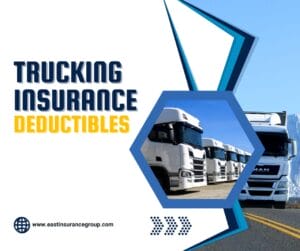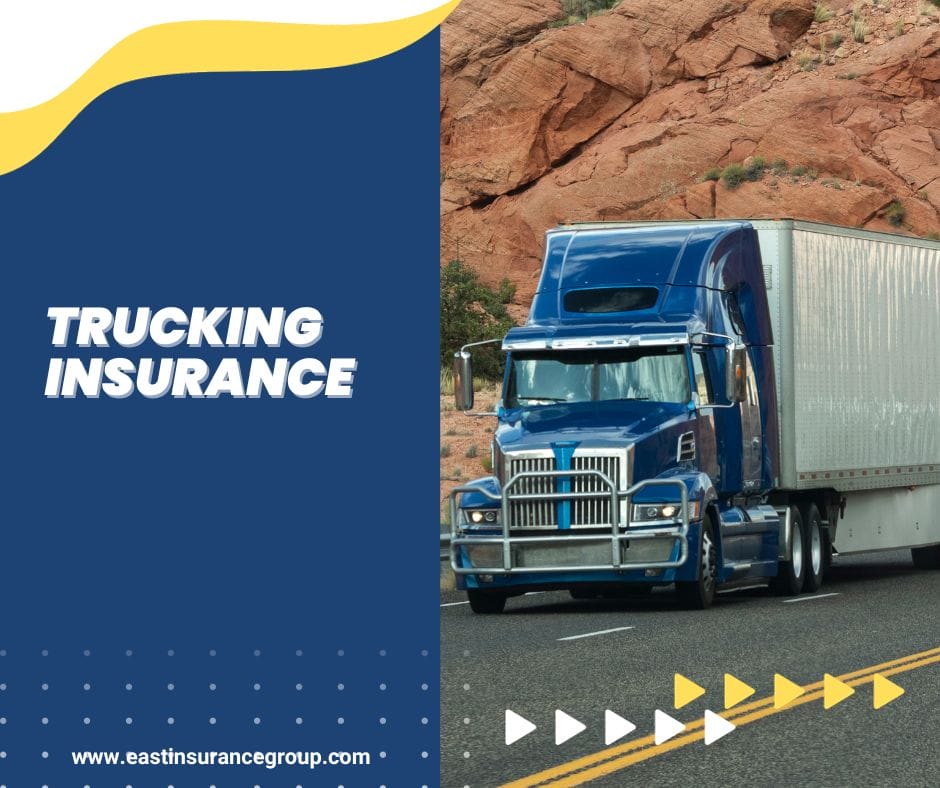I. Introduction
Welcome to the world of trucking insurance, where understanding deductibles is your compass to navigate the financial side of things. This article is your guide to the importance of deductibles in trucking insurance and how they directly affect your costs and coverage.
Why Deductibles Matter:
Deductibles aren’t just a money concept; they’re like your financial safety net. They determine what you’re responsible for if something goes wrong, like an accident or damage. Getting a handle on deductibles is key to managing your insurance costs while keeping your protection intact.
What to Expect:
In this article, we’ll take a journey through the world of deductibles in trucking insurance. We’ll start with the basics, explore the types of deductibles, and dive into how they impact what you pay for insurance. We’ll also look at factors that help you decide on the right deductible, and we’ll weigh the pros and cons of high versus low deductibles. By the end, you’ll be equipped with the knowledge to make savvy choices for your trucking insurance. So, let’s hit the road and explore the world of deductibles!
II. What Are Deductibles in Trucking Insurance?

To make sense of deductibles in the realm of trucking insurance, it’s essential to grasp the basics. Let’s break it down without the jargon:
Defining Deductibles:
Deductibles are like the part you pay when things don’t go as planned. Think of them as your share in case of accidents or mishaps. For trucking insurance, this is the money you agree to cover before your insurance kicks in.
How They Work:
In the world of trucking insurance, deductibles come into play when you need to file a claim. If you have a deductible of $1,000 and a claim for $5,000, you’d pay the first $1,000, and your insurance would handle the remaining $4,000.
Flexibility in Deductibles:
The great thing about deductibles is that they’re not set in stone. You can often choose your deductible level, meaning you can pick what you’re comfortable paying out of pocket if something happens. The catch? Your deductible choice can affect your insurance premium—pay less upfront, and your premiums may be higher; pay more upfront, and your premiums might be lower.
So, think of deductibles like the financial settings on your truck’s dashboard, letting you decide how much you’re willing to handle on your own before your insurance joins the ride.
III. Types of Deductibles
Deductibles in trucking insurance aren’t one-size-fits-all; they come in different flavors. Let’s take a look at the common types of deductibles you’ll encounter and how they play into the cost and claims aspects:
Fixed Deductibles:
- Fixed deductibles are like a set amount you agree to pay in case of a claim. For instance, if you choose a fixed deductible of $1,000, you’ll pay that exact amount each time you file a claim, regardless of the total claim value.
Percentage Deductibles:
- Percentage deductibles are a bit different. Instead of a fixed amount, they’re calculated as a percentage of the total claim value. So, if you have a 10% deductible and file a $5,000 claim, you’d pay $500 (10% of $5,000).
Affect on Premium Costs:
- The type of deductible you choose can influence your insurance premium. In general, opting for a higher deductible, whether fixed or percentage-based, often leads to lower premium costs. It’s like saying, “I’ll cover more of the cost if something goes wrong, so give me a break on my premiums.”
Claims Impact:
- When it comes to claims, your choice of deductible determines how much you’ll pay out of pocket. Fixed deductibles mean you’ll know the exact amount you’re responsible for, while percentage deductibles fluctuate with the claim’s value. So, consider how different deductible types align with your financial strategy and risk tolerance when making your decision.
Understanding these deductible types helps you tailor your trucking insurance to your specific needs, keeping your finances and coverage in check.
IV. Factors Influencing Deductible Choices
When it comes to choosing the right deductible for your trucking insurance, there’s more to consider than just the numbers. Let’s delve into the factors that play a pivotal role in making this decision:
- Risk Tolerance: Your risk tolerance is like your comfort level with financial exposure. If you’re averse to taking on higher costs in the event of a claim, a lower deductible might be your choice. On the other hand, if you’re comfortable shouldering more of the financial burden, a higher deductible could work.
- Financial Capacity:Assessing your financial capacity is crucial. Can you comfortably cover the deductible amount if a claim arises? Choosing a deductible that aligns with your financial capabilities ensures you’re not caught off guard by unexpected expenses.
- Operational Specifics:The nature of your trucking operations can influence your deductible decision. If your cargo is high-value or particularly susceptible to damage, a lower deductible might be a wise choice. Conversely, if your cargo is less valuable or damage-resistant, a higher deductible could be a cost-effective approach.
- Claims History: Consider your claims history. If you’ve had minimal claims or a history of safe operations, you might be more inclined to opt for a higher deductible. A strong safety record can often translate into lower claims frequency.
- Premium Costs:Balancing your deductible choice with your premium costs is crucial. A lower deductible typically results in higher premium costs, while a higher deductible often leads to lower premiums. Finding the right equilibrium is a key part of this decision.
- Regulatory Requirements: Sometimes, regulatory bodies or contracts with clients may dictate minimum deductible levels. It’s essential to ensure your deductible choice aligns with any external requirements you need to meet.
In the end, the ideal deductible choice is a blend of your risk tolerance, financial capacity, and operational considerations. By taking these factors into account, you can make an informed decision that keeps your trucking insurance aligned with your specific needs and circumstances.
V. Cost of Commercial Truck Insurance Rates

When it comes to commercial truck insurance, costs are a significant consideration. Let’s dive into the key factors that influence commercial truck insurance rates and how your deductible choices can affect those premiums:
Factors Influencing Commercial Truck Insurance Rates:
- Driving Records: Safe driving records typically lead to lower premiums. A history of accidents or violations can result in higher insurance costs.
- Type of Cargo: The value and nature of the cargo you transport play a role. High-value or hazardous cargo often leads to higher premiums.
- Vehicle Type and Condition: The age, make, and condition of your trucks impact rates. Well-maintained, safe vehicles can lead to lower premiums.
- Coverage Limits: The level of coverage you select influences costs. Higher coverage limits come with higher premiums.
- Location and Routes: The areas you operate in and the routes you take affect rates. High-traffic or high-crime areas can lead to increased premiums.
- Deductible Choices: Your choice of deductible directly affects premium costs. Opting for a higher deductible usually results in lower monthly premiums, while a lower deductible can lead to higher premiums.
Managing Insurance Costs Without Compromising Coverage:
- Balance Deductibles and Premiums: Evaluate your risk tolerance and financial capacity when choosing deductibles. A higher deductible can lower premiums, but make sure it’s a level you can comfortably cover.
- Risk Management: Implement strong safety and risk management practices to reduce the likelihood of claims, which can lead to lower long-term insurance costs.
- Compare Quotes: Shop around and obtain quotes from multiple insurance providers. This can help you find the best deal without sacrificing coverage quality.
- Bundle Policies: Consider bundling multiple insurance policies, such as auto and liability, with a single insurer. This can often lead to discounts.
- Driver Training: Invest in driver training and safety programs to reduce accidents and claims. Insurers may offer discounts for such initiatives.
By understanding the factors affecting commercial truck insurance rates, making informed deductible choices, and implementing cost-saving strategies, you can effectively manage your insurance costs without compromising the quality of your coverage.
VI. Big Rig Insurance
Big rig insurance is all about the unique world of insuring large commercial vehicles, particularly tractor-trailers and big rigs. Let’s break down what it encompasses and why deductible choices matter:
Defining Big Rig Insurance:
Big rig insurance is like the heavyweight division of commercial truck insurance. It’s designed specifically for large, heavy, and often long-haul vehicles, such as tractor-trailers, semi-trucks, and big rigs. These vehicles have distinct insurance needs due to their size, weight, and the valuable cargo they carry.
Unique Considerations for Big Rigs:
Insuring big rigs isn’t a one-size-fits-all affair. These vehicles come with their own set of considerations, such as:
- Cargo Value: Big rigs often transport high-value cargo, making cargo insurance a crucial component.
- Long-Haul Risks: Long-distance routes bring additional risks, making breakdown coverage and trip interruption insurance essential.
- Specialized Equipment: Big rigs may have specialized equipment like refrigeration units. Insurance needs to account for these unique features.
- Weight and Size: The size and weight of big rigs can lead to more severe accidents, necessitating higher coverage limits.
Deductibles in Big Rig Insurance:
Choosing the right deductible in big rig insurance is critical. A higher deductible can lead to lower premiums, which can be beneficial for budget-conscious owners. However, it also means a greater financial responsibility in the event of a claim. It’s important to align your deductible choice with your risk tolerance and financial capacity.
Tips and Best Practices:
Securing appropriate insurance coverage for big rigs requires a strategic approach:
- Consult an Expert: Consider working with an insurance expert who specializes in big rig insurance. They can help you navigate the complexities and tailor coverage to your specific needs.
- Cargo Coverage: Ensure your cargo coverage matches the value and nature of the cargo you transport.
- Coverage Limits: Evaluate your coverage limits to ensure they’re adequate, given the size and weight of your vehicles.
- Safety Measures: Implement rigorous safety measures and training for drivers to reduce accidents and claims.
- Regular Review: Periodically review your insurance coverage to make adjustments as your operation evolves.
Big rig insurance is like the heavyweight champion of the insurance world, and it comes with its own set of rules. By understanding the unique considerations, making informed deductible choices, and following best practices, you can ensure that your big rigs are appropriately protected on the road.
VII. Conclusion
The Importance of Trucking Insurance:
Trucking insurance isn’t just a requirement; it’s the safeguard that keeps your operations rolling. It’s the shield that protects your financial well-being when unforeseen events occur. The importance of insurance in the trucking world cannot be overstated. It’s the foundation of responsible and risk-conscious operations. Without the right coverage and deductible decisions, the road to success becomes a winding and uncertain journey.
Significance of Understanding Deductibles:
Understanding deductibles isn’t just a technicality; it’s the compass guiding cost-effective and risk-conscious operations in the trucking world. It’s about finding the right balance between immediate costs and long-term financial well-being. It’s about making informed decisions that protect your bottom line while ensuring that you’re prepared for unexpected events.
Take Control of Your Deductible Choices:
Trucking companies, whether small fleets or large operations, have the power to assess their deductible choices strategically. By aligning deductibles with risk tolerance, financial capacity, and operational specifics, you can make decisions that work for your unique circumstances. Remember that risk management and safety measures go hand in hand with deductible choices to reduce the likelihood of claims.
So, as you continue down the road of trucking insurance, take charge of your deductible decisions. By adopting best practices and continually reassessing your coverage, you can strike that delicate balance between cost-effectiveness and risk-consciousness that defines successful and secure trucking operations.

